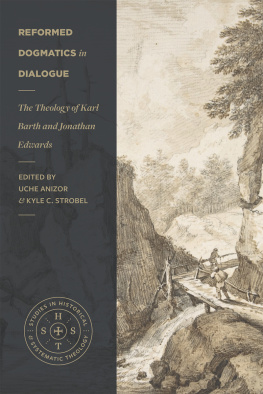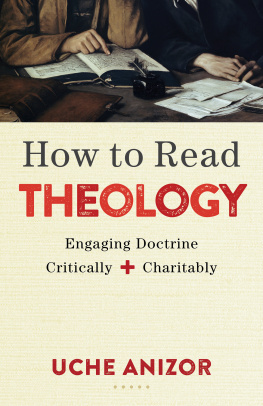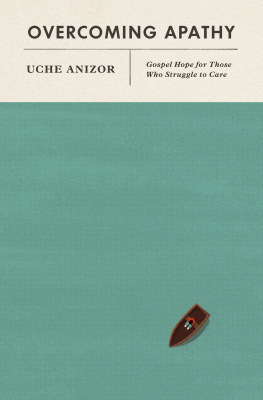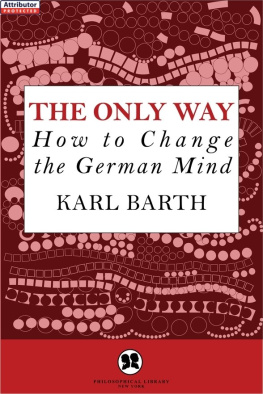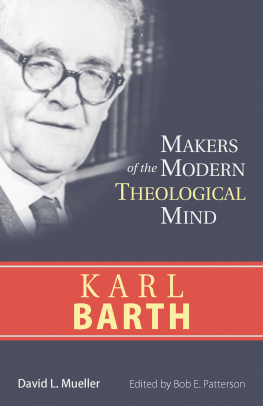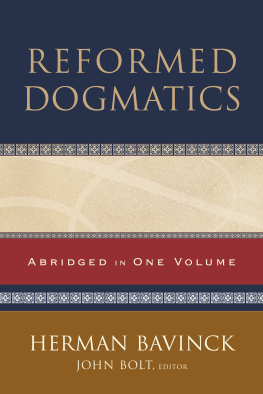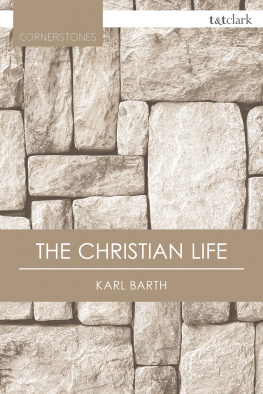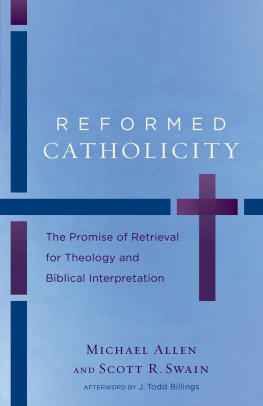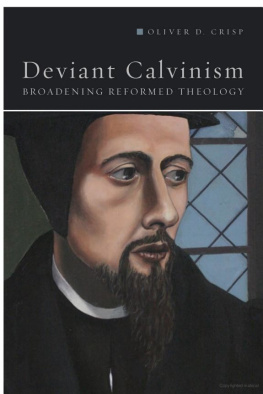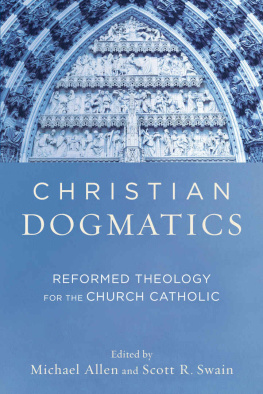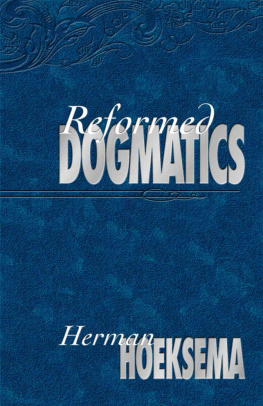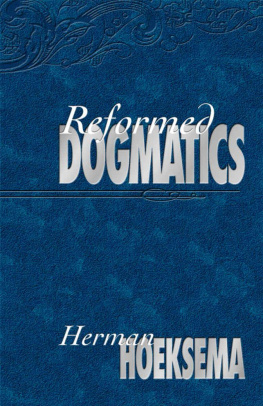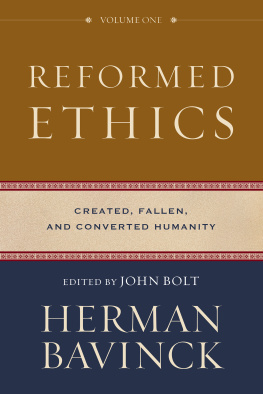REFORMED DOGMATICS in DIALOGUE
The Theology of Karl Barth and Jonathan Edwards
Edited by UCHE ANIZOR & KYLE C. STROBEL
STUDIES IN HISTORICAL AND SYSTEMATIC THEOLOGY


Reformed Dogmatics in Dialogue: The Theology of Karl Barth and Jonathan Edwards
Studies in Historical and Systematic Theology
Copyright 2022 Uche Anizor and Kyle C. Strobel
Lexham Academic, an imprint of Lexham Press
1313 Commercial St., Bellingham, WA 98225
LexhamPress.com
All rights reserved. You may use brief quotations from this resource in presentations, articles, and books. For all other uses, please write Lexham Press for permission. Email us at .
Unless otherwise noted, Scripture quotations are from ESV Bible (The Holy Bible, English Standard Version), copyright 2001 by Crossway Bibles, a publishing ministry of Good News Publishers. Used by permission. All rights reserved.
Scripture quotations marked (KJV) are from the King James Version. Public Domain.
Print ISBN 9781683596172
Digital ISBN 9781683596189
Library of Congress Control Number 2022933921
Lexham Editorial: Todd Hains, Andrew Sheffield, John Barach, Mandi Newell
Cover Design: Brittany Schrock

We would like to dedicate this volume to the numerous theologians at Biola
University who have helped to create a rich and vibrant context for theological
reflection. Thank you for your continued willingness to pore over difficult texts,
wrestle through the implications of Christian belief, and bear witness to the
calling of a theologian as a theologian for the church.
CONTENTS
Uche Anizor and Kyle C. Strobel
Kyle C. Strobel
Doug Sweeney and Kevin Vanhooozer
Christina N. Larsen
Darren Sumner
Seng Kong Tan
Uche Anizor
Amy Plantinga Pauw
Kenneth Oakes
Kyle C. Strobel
Marc Cortez and Daniel Houck
Adam J. Johnson
Kirk J. Nolan
Matt Jenson
Nathan Hitchcock
We would like to begin by thanking Biola University, and more specifically Talbot School of Theology, for creating the space and providing the release time (in Uches case) to wrestle through the great theological minds of the Christian tradition. It is rare to find a place where you can walk out of a class on Aquinas to a reading group on Maximus to a faculty discussion on Pseudo-Dionysius, but those sorts of interactions are not unusual at Biola. More specifically, the Classical Theology program has provided a place to read the great texts of the Christian tradition with eager-minded students and collaborative faculty, and we are both encouraged that this sort of recovery is still taking place within a distinctively evangelical context. We hope that this volume encourages this sort of dialogue as we seek to be faithful witnesses to the gospel in this present evil age.
We would like to thank Lexham Press for catching the vision of this volume and all the contributors who were willing to put two difficult thinkers into conversation. We hope that it was a fruitful endeavor personally and that it will bear fruit in the minds of students and scholars alike. A special thanks goes out to Todd Hains at Lexham for working with us on this volume, as well as those individuals who were willing to read material for us. Thanks to Ty Kieser and Scuter Koo, for your willingness to read drafts for Kyle and provide meaningful and insightful feedback; it is a blessing to have seen you both develop as scholars. We would also like to thank Barnabas Kwok for his willingness to carefully edit a draft of this volume. And thanks to Georgio Khachadourian for compiling our many indexes.
All but two of the chapters of this volume were written explicitly for this project, and so we would also like to thank the publisher and journal that allowed us to reproduce edited and adapted versions of two pieces. We thank Blackwell Publishing for allowing us to reproduce Kyles chapter Barth and Edwards from The Wiley-Blackwell Companion to Karl Barth, edited by George ).
Finally, wed like to thank our families for their constant support as we pursue the joyous task of writing about and reading theologians like Edwards and Barth.
CD | Karl Barth, Church Dogmatics , 4 vols. Edited and translated by Geoffrey W. Bromiley. Edinburgh: T&T Clark, 19561975. |
KD | Kirchliche Dogmatik |
WJE | Works of Jonathan Edwards, 26 vols (New Haven, CT: Yale University Press, 19572008) |
WJEO | Works of Jonathan Edwards Online. Jonathan Edwards Center at Yale University. http://edwards.yale.edu/archive/. |
Uche Anizor and Kyle C. Strobel
Trailed by controversy, heralded and revered as giants in Reformed theology, and yet questioned regarding their true commitment to it, Jonathan Edwards and Karl Barth remain two of the most influential theologians of the modern era. A case could be made for Edwards being the greatest English-languagenot just Americantheologian ever, and for Barth as the greatest German-language theologian to date. A cursory glance at the sheer volume of writings produced by both men is testimony enough of their importance. However, it is the not mere volume of work that makes one great, but the range, quality, depth, sophistication, timeliness, and prophetic insightfulness of that work. On these points, few, if any, surpass these two modern theologians.
Regardless of its importance in weighing the impact of each thinker, the volume of their output is certainly a reason for the breadth of secondary literature. For both thinkers, their corpus has raised questions concerning development and radical shifts and has led to schools of interpretation based on these possible trajectories. The online edition of Edwardss Works housed at Yale numbers seventy-three volumes, composed mainly of sermons but covering notebooks, letters, and a variety of other works. Edwardss interests and work cover the whole range of thorny theological issues The End of Creation , The Nature of True Virtue , Original Sin , Freedom of the Will , The History of the Work of Redemption , and Religious Affections , to name a fewnot to mention his penetrating analyses of the religious awakenings of his day. Not much in Edwardss work was rote or simplistic, narrow or detached; there was a pastoral care and intellectual seriousness to his writings that few of his heirs have been able to replicate. As for Barth , the voluminous Church Dogmatics is the clear reference point for the range, depth, and insightfulness of his theology. However, to capture fully his powers as a theologian, one would also be directed to his Romans commentary; his astute analysis of nineteenth-century Protestant theology; his readings of Calvin, Anselm, and the Reformed Confessions; and Evangelical Theology , not to mention his countless occasional pieces and shorter studies such as Nein! , Credo , Christ and Adam , and The Humanity of God . His letter of commendation is the various influential theologians stimulated by serious engagement with his thought: T. F. Torrance, Hans Urs Von Balthasar, Hans Frei, Colin Gunton, and John Webster, to name just a few.

